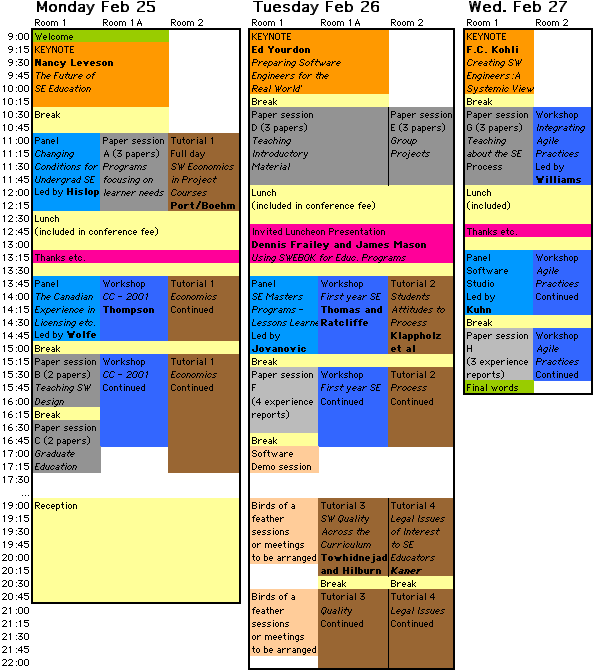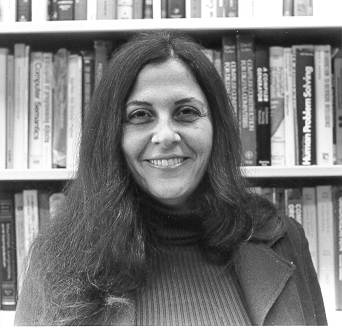



Program Overview
The conference is now over. This page is for the historical record.You can click on most of the sessions to see the details.

Summary
The following is the plan for the conference. We reserve the right to make last-minute changes:
- Three Keynote talks by Nancy Leveson, Ed Yourdon, and F.C. Kohli (see
below)
- An invited luncheon talk on Tuesday by Dennis Frailey
and James Mason: Applying SWEBOK to industrial and university education
programs
- A Monday evening reception sponsored my Microsoft
- Four panel sessions.
- Sixteen regular papers, organized into 6 sessions,
and seven
experience report papers, organized into 2 sessions.
- Four Tutorials (at an extra cost)
- A session at which participants will demonstrate educational
software.
- Three Workshops
Layout of the conference area
Allocations of rooms
Monday Feb 25 ------------- 09:00-10:30 (Hotel supplies coffee break at 10:30) - Welcome and Nancy Leveson Keynote -> Thoroughbred+Keeneland 11:00-12:30 - Panel - Undergrad SE -> Thoroughbred - Paper session A -> Keeneland - Tutorial 1 - SE Economics - Port/Boehm -> Derby 12:30-13:45 - Lunch -> Commonwealth 13:45-17:30 (Hotel supplies coffee break at 15:00) - Panel (Canadian Licensing + papers B&C)-> Thoroughbred - Workshop (CCSE 2001) -> Keeneland - Tutorial 1 - SE Economics - Port/Boehm -> Derby 19:00-21:00 - Reception -> 16th Floor Tuesday Feb 26 -------------- 09:00-10:15 (Hotel supplies coffee break at 10:15) - Ed Yourdon Keynote -> Thoroughbred+Keeneland 10:30-12:00 - Paper session D -> Thoroughbred - Paper session E -> Keeneland 12:00-13:45 - Lunch and Frailey/Mason talk -> Commonwealth 13:45-17:00 (Hotel supplies coffee break at 15:15) - Panel (SE Masters) + papers F -> Thoroughbred - Workshop (First year SE) -> Commonwealth - Tutorial 2 - Process - Klappholz -> Keeneland 19:00-22:15 (Coffee break at 20:30) - Birds of a feather -> Commonwealth - Tutorial 3 - Quality - Hilburn -> Thoroughbred - Tutorial 4 - legal - Kaner -> Keeneland Wednesday Feb 27 ---------------- 09:00-10:15 (Hotel supplies coffee break at 10:15) - F.C. Kohli Keynote -> Thoroughbred+Keeneland 10:30-12:00 - Paper session G -> Thoroughbred - Workshop - Agile -> Keeneland 12:00-13:15 - Lunch -> Commonwealth 13:45-16:00 (Hotel supplies coffee break at 14:30) - Panel (SW Studio) + papers H + Closing -> Thoroughbred - Workshop - Agile continued -> Keeneland
Keynote Speakers
CSEE&T 2002 welcomes three eminent keynote speakers:
|
Nancy LevesonTitle: The Future of Software Engineering EducationAbstract: Software engineering degrees and classes are sprouting up everywhere -- particularly outside computer science departments. Attempts to extend Professional Engineer licensing, while well-intended, may make it impossible for those with computer science degrees to be licensed. At the same time, the proper content of software engineering education is debatable. For example, do those who will work on embedded software to control spacecraft require the same education as those who will be writing business software? Does software engineering education rightly belong within computer science departments or would it be better outside traditional CS departments? This talk will explore alternative views of the future of software engineering education and training in order to encourage discussion of these and other questions.
|

|
Ed YourdonTitle:Preparing Software Engineers for the 'Real World'Abstract:For years, veteran programmers and project managers in corporate IT departments have complained that universities teach software engineering material that is either obsolete, irrelevant, or far too theoretical in nature. And while academia might disagree with such criticisms, it would at least be useful to have some additional insights into the things that industry believes are important and relevant. Ed Yourdon's keynote presentation will focus on several of these "competencies," which the academic community may or may not wish to incorporate into the software engineering curriculum. For example, a major area of discussion and debate in industry today involves the tradeoffs between "light", agile software processes versus "heavy" processes such as the ones associated with the SEI-CMM. Similarly, industry practitioners are constantly debating the relative merits of a "zero-defect" quality approach, versus a "good-enough" approach to design, coding, and even testing. And industry practitioners are finding that the best way to teach these concepts, within their own corporate classrooms, involves "war-games" based on realistic simulation models of software projects.
|
F.C. KohliTitle: Creating Software Engineers - a Systemic ViewAbstract: Software Engineering as a profession and its associated Education & Training have to be addressed in a holistic way. We need to identify all relevant stakeholders along with their unique needs and constraints before embarking on design interventions. Looking at the attributes of a generic engineering artifact, we derive the framework for producing a "total" software engineer. We look at Software Development as a problem solving and model refinement activity. We need to rely on linkages with other established branches of engineering and science. Formal academic institutions have to create an ambience for learning knowledge of permanent value. We discuss the responsibility of Industry in shaping professionals who can deliver safe and dependable solutions to societal problems. . Professional bodies such as IEEE need to play a more proactive role in setting standards for the profession, duly taking into account the needs of all stakeholders. We provide pointers of how the Indian industry has been able to harness the country's Human Resources in building robust Software Enterprises.
|
Invited Tuesday Luncheon Talk: Using SWEBOK for Education Programs in Industry and Academia
Dennis J. Frailey (Raytheon Company and Southern Methodist University) and James Mason (Securities Industry Automation Corporation)This talk explores how the Guide to the Software Engineering Body of Knowledge (SWEBOK) was used to accelerate adoption of a software engineering capability development program within a major software development organization - the Securities Industry Automation Corporation (SIAC). It also discusses use of the SWEBOK to align a workforce development effort to help support a software process improvement (SPI) initiative; how SWEBOK helped improve a masters level software engineering program at Southern Methodist University (SMU); and, finally, an innovative education program that resulted.
Panel sessions
Panel 1 (Monday at 11 a.m.): Changing Conditions for Undergraduate Software Engineering Programs.
Speakers include Gregory W. Hislop (Drexel University -Chairperson), Michael J. Lutz (Rochester Institute of Technology), Ray Vaughn, (Mississippi State University) and David A. Umphress (Auburn University).
Outline
The number of undergraduate software engineering degree programs worldwide is still small but growing. Many of the early programs, especially in the United States, have had to deal with difficult issues crossing disciplinary and organizational boundaries. Some institutions are struggling to address these issues today and others will need to deal with them in the future. Unless many of these efforts are successful software engineering will not be successful as a discipline.While the early undergraduate software engineering initiatives have unfolded at various universities, conditions for these efforts have been changing. Key features of the landscape including accreditation, licensing, and curricular models are all changing. In addition, future initiatives will have the start-up experience and early success of the first programs as points of reference. All of these factors will change the context for future efforts.
This panel session will discuss the experience of several universities in starting and managing software engineering programs. In particular, the discussion will focus on how issues and approaches have changed over time. This discussion should be useful to faculty at other institutions considering starting software engineering programs. The panel discussion will include consideration of the following topics:
- Participants Who among faculty or administrative groups have supported or resisted software engineering programs?
- Organization -- Where have software engineering programs been located within the university?
- Issues -- What key points have formed the positions of those supporting or resisting software engineering programs?
- Success factors -- What were the key events or factors that helped in establishing the program?
- Evolution -- How have the issues and approaches related to the software engineering program changed over time?
- Perception How has the perception of the software engineering program changed within the university since initial approval?
So you can get more of an idea of what CSEET 2002 will be like, see last year's conference
program
Panel 2 (Monday at 1:45 p.m.) The Canadian Experience in Licensure and
Accreditation.
Speakers include Deborah Wolfe (Canadian Council of Professional
Engineers), Gillian Pichler (Director, Registration at the Association of
Professional Engineers and Geoscientists of British Columbia (APEGBC)),
and Digvir Jayas (Chair of the Canadian Engineering Qualifications Board
and VP Research at University of Manitoba). Outline
Over the past several years, software engineering has come into the
spotlight in Canada in that:
The panel presentation will cover the following areas:
Panel 3 (Tuesday at 1:45 p.m.): Software Engineering Masters Programs-
Lessons Learned.
Speakers include Vladan Jovanovic (Georgia Southern University -
Chairperson), Ken Modesitt (University of Michigan), D. Matlen (US Army
TACOM), A professor from the Naval Postgraduate School, D. Shoemaker
(University of Detroit) and P. MacNeil (Mercer University).Outline
Nowadays most of the attention is on instantiating undergraduate programs
in Software Engineering. Given that many of the master programs are well
established, certainly there are lessons learned and advances in
pragmatics of instruction that will be of help to new Undergraduate
Programs. Furthermore variations of intent and organization of existing
master programs provide numerous models of interest for undergraduate
programs. And finally, the future of undergraduate education in Software
Engineering cannot be fully discussed without an assessment of the trends
among graduate programs, including what is going on at the Doctoral level.
Lack of qualified teachers in numbers needed for a growing number of
undergraduate programs is also a concern. To recapitulate, while there are
good reasons to discuss models and lessons learned by graduate programs
for the benefits of those programs, the usefulness for a growing number of
undergraduate programs may be even greater. The panel will focus on Master
Level Curriculum Models and Pragmatics of Instruction in form of Lessons
Learned and will be attractive to faculty with direct experience with
and/or interest in programs in Software Engineering. Attendance of a
number of Department Chairs and/or curriculum developers is expected.
Panel 4 (Wednesday at 1:15 p.m.): The Software Studio in Software
Engineering Education.
Speakers include Sarah Kuhn (Dept of Regional Economic and Social
Development U. Massachusetts Lowell), Orit Hazzan (Department of
Education in Technology and Science, Technion Israel Institute of
Technology), James E. Tomayko (School of Computer Science and SEI,
Carnegie Mellon University) and Bruce Corson (Corson Associates -
Architects)Outline
Four panellists, representing a variety of backgrounds and perspectives,
discuss the use of ³studio² teaching in software engineering and computer
science education. Taking its inspiration primarily from the studio
tradition in the training of architects, the software studio offers
students an intensive, project based, multifaceted experience that
integrates many competencies. The panellists explore various aspects of
and experiences with studio education, with particular emphasis on Donald
Schön's concept of "reflective practice."
Paper sessions
Paper session A (Monday at 11 a.m.): Programs Focusing on
Learner Needs.
Session Chair: Peter Knoke
Paper session B (Monday at 3:15 p.m.): Teaching Software Design.
Session Chair: Peter Henderson
Paper session C (Monday at 4:30 p.m.): Graduate Education.
Session Chair: Ana Moreno
Paper session D (Tuesday at 10:30 a.m.): Teaching Introductory
Material.
Session chair: Ann Sobel
Paper session E (Tuesday at 10:30 a.m.): Group Projects.
Session Chair: To be determined
Paper session F (Tuesday at 3:30 p.m.): Experience Reports.
Session Chair: Elizabeth Towell
Paper session G (Wednesday at 10:30 a.m.): Teaching about the SE
Process.
Session Chair: To be determined
Paper session H (Wednesday at 2:45 p.m.): Experience Reports.
Session Chair: Jorge Diaz-Herrera
Conference program
Registration page
Main page
For the historical record only ...